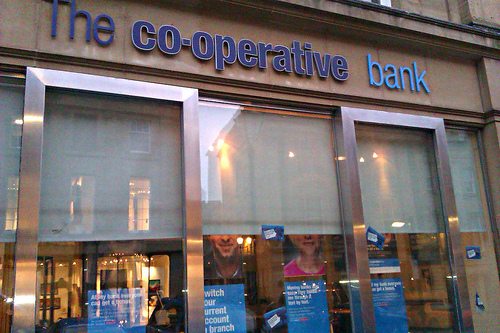

Economy
Ethics, mutuals and the Co-operative Bank’s unclear future
Once seen as the leading ethical banking option, the Co-operative Bank has endured a tough 12 months after financing problems led to it unveiling a £1.5 billion rescue plan. It was recently revealed it was set to give majority control to two US hedge funds. Nicky Stubbs looks back at its difficulties, and asks what they might mean for its future.
This article originally appeared in The Guide to Sustainable Banking 2013.
It was April 2013 when it emerged that the Co-operative Bank had come into financial difficulties. A deal to purchase 632 Lloyds branches – which would have increased its market share from 1% to 7% – fell through, leading many to question why.
The collapse of the deal owes its origins to the Co-op’s 2009 acquisition of Britannia Building Society, and along with it, the bad debts accumulated by Britannia. The complexities that are so defining of the banking system mean that however fiscally disciplined one bank may be, it is not immune to the problems that exist outside its own walls.
As a result, the Co-operative encountered a £1.5 billion shortfall in its balance sheet. To plug the hole, shares were made available for commercial investors – for the first time in its 141-year history.
The process of diversifying a co-operative creates a contradiction in values when one considers that a mutually-owned organisation is, by definition, owned by its consumers. This contrasts with a traditional capitalist system. The Co-op has long prided itself on political and economic independence, but will a shareholder-based system allow for continued strong ethical values within the organisation?
Euan Sutherland, CEO of overarching Co-op Group, insisted at the time that its focus on ethical banking would continue, telling the BBC back in June, “[There is] no change to our ethos or the way we run our bank.”
These assertions were also supported by other professionals, including Martin Shaw, chief executive of the Association of Financial Mutuals, who said that customers would not notice any difference in the way things were being run.
Theoretically, the Co-operative Bank does not exist as a co-operative in its purest form – that is, with direct consumer ownership – due to a lack of clarity in British regulation. Whilst other European countries enjoy a system where the assets are commonly owned by members, UK banks exist officially as a company in their own right. This is owned by members, through a system of profit sharing.
In an article written around the time of the Lloyds deal collapse, Ed Mayo, secretary-general of trade body Co-operatives UK, set out the basic formulation of a co-operative.
“What starts as one form of enterprise can change”, he said.
“Some co-operatives begin as 100% member owned, and then diversify, offering shares to investor-owners. This applies mainly to farmer co-ops, but also, internationally, to some others needing large investments, such as telecoms and insurance co-operatives.”
The Co-operative Bank is defined by these terms, and the diversification of the bank was certainly a necessity so that it could continue its work, which customers have been promised will not differ.
Mayo continued, “While member ownership is obscured it still exists in a pure form behind the business. Sometimes investors are brought into direct ownership, and here the business can still be seen as member-owned if members retain more than 50% of the equity. However, there are doubts as to whether in practice members can exert enough influence to be said to be still in control.”
So as long as a bank retains that system throughout at least 51% of the company, it is, by definition, a co-operative, where the interests of its members come first. The Co-op’s co-operative status became a bit hazy when the bank revealed a large proportion of its assets would be in the hands of outside investors.
After its recent shake-up, including investment from two US hedge funds, the Co-operative Group itself now has around a 30% stake.
Although there may have to be some form of compromise in governance, its executives certainly need to continue to advocate ethical practices. And with strong governance, the Co-operative Bank can continue to serve its customers and the wider community in which it operates.
The next 12 months will therefore be crucial in the future of the Co-op. The industry and society will be severely let down if it fails to maintain the ethical leadership it has displayed over the past few decades.
Further reading:
Co-op Bank can no longer be ethical, says ex-CEO
Co-op Group could give up majority control of bank to US hedge funds
Co-operative Group considers repayments as part of bank rescue plan
Co-operative Group records £559m loss due to struggling banking arm


 Environment12 months ago
Environment12 months agoAre Polymer Banknotes: an Eco-Friendly Trend or a Groundswell?

 Features11 months ago
Features11 months agoEco-Friendly Cryptocurrencies: Sustainable Investment Choices

 Features12 months ago
Features12 months agoEco-Friendly Crypto Traders Must Find the Right Exchange

 Energy11 months ago
Energy11 months agoThe Growing Role of Solar Panels in Ireland’s Energy Future



























